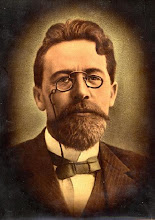Perhaps the most significant lesson I have gleaned from this project is the value of rereading. My first reading of "Misery" left me without even a start at what this story might be implying. Obviously, it seemed to me, Iona was suffering. His son had died. Was that it? Would Chekhov go these lengths just to tell a story of how a man could not express the death of his son? But then reading again I saw that it was not only the death which troubled Iona, but the lack of speaking it, or speaking in general. He would brighten with the company of the cruelest deaths. This seemed to me a much more satisfactory answer. Then I read the story again. This time I saw that it was more than loneliness which troubled Iona, but a complete lack of relation to the world. There he is, doubled against the cold, the misery in his heart, enough to drown the world, yet in his heart it remains. On the one hand there is Iona with his sorrow, on the other there is the world, disinterested, unmoved, and not drowning in misery (at least not the misery of Iona). No matter how strong the misery Iona experiences, none of it will be felt by the world, in him is the only place. Thus I went to a questionable first reading to a final understanding that perhaps Chekhov did not intend, but which I nonetheless extracted from multiple readings.
Secondly, I am beginning to understand how there is a more 'objectified reading' than I had initially thought. I was horrified reading Flynn at the beginning of the quarter and seeing her project her understanding of the story (portrayed as the 'right' reading) onto all of her poor students. The act of understanding literature is new to me, and it seemed that there ought to be a better reading than others, but how could that be? So I have begun to sympathize with the concept of better readings, though it still remains a tricky qualifier. This I could see from reading the responses of my group members; all seemed to be striving for some meaning in the text, and all the striving, though they lead to slightly different conclusions, was all in the same direction. Some saw this as a story of sadness because of a lost son, some saw the story as sadness because of loneliness, and some saw the story as representing the objectivity of the world.
Lastly, I was also apprehensive about a group project, but upon reading the responses of the members I recognized the value of considering interpretations of others in literature. For example, one member noted the circularity of the story; it began and ended with Iona and his horse. I took this to mean that the story did not really go anywhere, a clip of life caught with no satisfying conclusion (for me playing further on the title of "Misery"). For others this was a consoling aspect, Iona found refuge in the horse. (This dissonance relates back to the above paragraph.) I also noticed that certain group members viewed this story through differing backgrounds. One member studying psychology understood this story as hinting towards class struggle. Again this relates to the 'meaning' which is embedded in literature, only to be extracted in fragments. Yet through rereading and conversation, something meaningful can result [sic].
Monday, February 15, 2010
Subscribe to:
Post Comments (Atom)

No comments:
Post a Comment